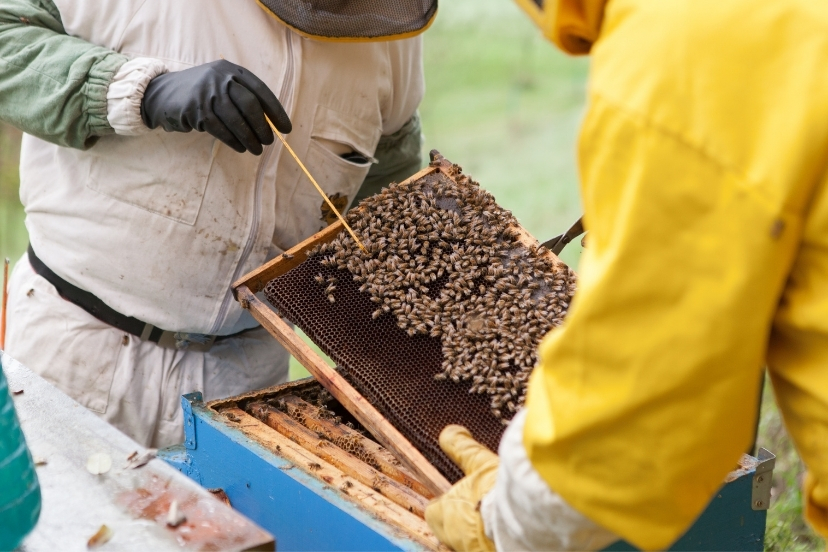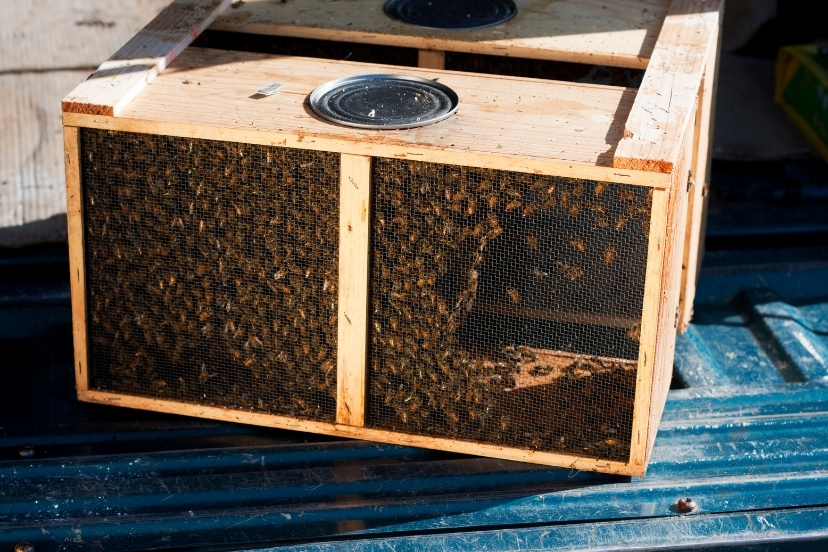If so, there are a few beekeeping basics that you’ll want to consider while making your decision.
For instance, you will need to decide if you can keep bees where you live.
You’ll need to consider whether you have any physical or health issues that might make beekeeping difficult.
You’ll probably also want to have at least a ballpark estimate of the cost of the “must haves” for getting started in beekeeping.
Very few people who are considering beekeeping will find any of these issues to be insurmountable barriers to getting started in the hobby.
But let’s spend a few moments considering these beekeeping basics – just in case.
Where Can You Keep Bees?
There really aren’t many places where you can’t.
If you live out in the country without any close neighbors, that is an ideal situation for beekeeping.
But not many of us are that lucky.
Most of us live in an urban area. And fortunately, beekeeping is perfectly plausible in both suburbs and cities.
A backyard is an excellent place to keep bees. You’ll just need to be considerate of your neighbors, and take precautions to prevent your bees from becoming pests.
You can even keep bees in the heart of a major city.
If you have access to a balcony or rooftop where the bees won’t conflict with other tenants or passers-by, and if there are flowering plants within a couple of miles to provide forage for the bees, they’ll do fine.
One caveat, though: wherever you live, you MUST find out if there are any laws restricting or prohibiting the keeping of bees.
Such laws do unfortunately exist.
And even though these laws are asinine and counter-productive (please excuse the mini-editorial!), it is YOUR responsibility to be aware of these laws and conform to them.
Better yet, try to get them changed!
Health Considerations
Another beekeeping basic to consider is that beekeeping can be somewhat of a physical hobby, and can involve some heavy lifting.
A completely full honey super can easily weigh 40 pounds.
And when you’re examining your hives, you will be lifting supers off, stooping over and pulling out frames to examine the combs, and then stacking the supers back on as you reassemble the hive.
So if you have a REALLY bad back, the lifting and stooping might be a problem. On the other hand, you might be able to team up with someone who can handle most of the lifting.
And if you don’t have a bad back, be careful.
I’ve known of many beekeepers who haven’t done their backs any favors over the years. (One looks at me every day from the mirror!)
The strain of all that hefting and stooping can be cumulative, and can catch up to you in your advancing years.
Are You SURE That You’re NOT Allergic to Stings?
If you happen to be severely allergic to bee stings, you probably shouldn’t keep bees.
Only a minute percentage of the population is afflicted with this problem. But if you’re in this tiny group, it’s not worth the risk.
Even though you can buy complete bee suits that provide protection from head to toe, it’s not realistic to expect that you will keep bees without ever being stung.
It really doesn’t matter how many precautions you take; if you become a beekeeper, you WILL get stung!
What Does it Cost to Start Beekeeping?
It’s impossible, of course, to give an absolute answer to this question. Prices fluctuate, and shipping charges vary depending upon where you live and who you buy from.
But a reasonable planning estimate would be about $350 to get started.
This would include buying a complete hive (unassembled), the bees to stock it, and the necessary equipment and protective gear.
This estimate does not include any honey harvesting or processing equipment, but if you are producing comb honey instead of extracted honey, you can harvest and process your crop with little more than a kitchen knife.
How Many Hives Should You Start With?
The cost estimate above is for starting one hive.
But although it’s not necessary, it would be ideal to begin with two hives rather than one. Having two hives gives you some added flexibility in managing your hives.
If one hive, for example, is not doing well and needs a boost in brood or honey, you can transfer some from your second hive if it’s doing well.
But starting with two hives is only a luxury, not a necessity.
Don’t Forget the Time Commitment…
One last beekeeping basic to consider: time.
Once your beehives are started, they will require a certain amount of attention to keep them healthy and thriving.
But time spent with the bees is enjoyable, and after all, the enjoyable expenditure of time is the purpose of any hobby!
Just make sure that you have the time to spend. Because neglected bees is a bad thing.


